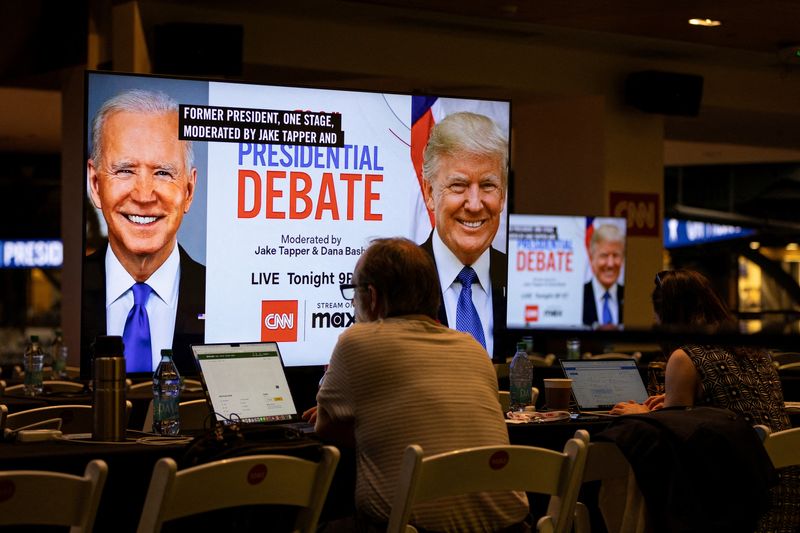A look at the day ahead in U.S. and global markets from Mike Dolan
If TV debates decided elections, world markets seem remarkably calm about the prospect of a Donald Trump return to the White House as the first half of the trading year ends on Friday.
It may be too early to stake bets on November's U.S. election outcome just yet, and there are many pressing issues on the table before then - not least a critical update on Friday on the PCE inflation gauge favored by the Federal Reserve and the first round of the French assembly election at the weekend.
But U.S. President Joe Biden's poor performance in Thursday's first of two televised face offs with Trump would appear to put the former President in pole position, with opinion polls before the event showing the two neck and neck.
Perhaps one reason for investor hesitancy was post-debate speculation that Democrats may push Biden to stand aside and see an alternative candidate selected at the party's convention instead.
Either way, U.S. stocks and the dollar were marginally higher early on Friday and Treasury yields steady. The VIX 'fear index' of equity volatility, and related futures on that index covering the election, remain subdued near the lowest levels of the year.
Even currencies potentially most sensitive to Trump's pledges on tariff rises or immigration barriers, like China's yuan or Mexico's peso were undisturbed.
Once again, the big mover on the currency markets was Japan's yen, which continued to wend its way to new 38-year lows and briefly breached 161 per dollar in the face of continued Japanese government warnings about a repeat of April's intervention to support it.
Japan appointed a new top foreign exchange diplomat as the yen plumbed new lows, heightening expectations of imminent action by Tokyo to shore up the ailing currency. Atsushi Mimura, a financial regulation veteran, replaces Masato Kanda.
French bonds markets grew nervier, meantime, ahead of the two-round French elections on Sunday and July 7. The risk premium on French government bonds over German equivalents rose to its widest since the euro zone crisis 12 years ago with polls still suggesting far right parties with the highest percentage vote, though still short of an overall majority in parliament.
The spread between German and French 10-year yields reached 84 basis points, its widest since September 2012, although nominal 10-year French yields remained below peaks seen late last year.
Back on Wall Street, the economic picture appeared to darken somewhat.
First-time applications for U.S. unemployment benefits drifted lower last week but the number of people on jobless rolls jumped to a 2-1/2 year high in mid-June, suggesting the labor market was cooling amid slowing economic growth.
Other data showed non-defense capital goods orders excluding aircraft, a closely watched proxy for business spending plans, unexpectedly dropping 0.6% last month and the goods trade deficit widened 2.7% to $100.6 billion.
All of which saw the Atlanta Fed's real-time 'GDPNow' estimate fall to 2.7%, with U.S. economic surprise indexes at their most negative in almost two years.
Better news is expected from the PCE inflation release for May out later. A 0.1% monthly increase in the core PCE is forecast and that would bring the annual core rate down to 2.6% - its lowest in more than three years.
Still, Fed officials still appear in no rush to loosen interest rates. Atlanta Fed President Raphael Bostic said on Thursday that inflation "appears to be narrowing" and that should allow one rate cut later this year - less that the 45bp priced into futures markets right now.
More hawkish Fed governor Michelle Bowman reiterated her stance: "We are still not yet at the point where it is appropriate to lower the policy rate, and I continue to see a number of upside risks to inflation."
And reflecting the thorny fiscal problems facing whoever wins next year's elections, the International Monetary Fund on Thursday called on the U.S. to raise taxes to curb rising debt levels while applauding "robust, dynamic" growth in the world's largest economy.
Elsewhere in company news, Nike (NYSE:NKE) lunged 12% in out of houses trading on Thursday after it forecast a surprise drop in fiscal 2025 revenue, hurt by faltering demand for its sneakers as consumers covet newer brands such as On and Hoka.
Key developments that should provide more direction to U.S. markets later on Friday:
* US May personal income and consumption and PCE inflation gauge, Chicago June business survey, University of Michigan final June consumer sentiment survey

* Federal Reserve Board Governor Michelle Bowman, San Francisco Fed President Mary Daly and Richmond Fed President Thomas Barkin speak
* Iranian Presidential election
(By Mike Dolan, editing by William Maclean mike.dolan@thomsonreuters.com)